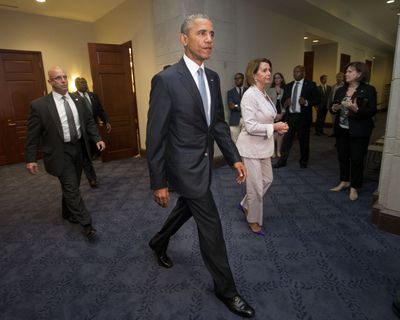Obama loses trade battle with Congress
House Democrats block ‘fast-track’ authority

WASHINGTON – President Barack Obama’s stunning loss Friday on Capitol Hill could spell more trouble for his ambitious plans to create the Trans-Pacific Partnership, the centerpiece of his economic agenda and a plan that he has spent his entire presidency pursuing.
When Democrats in the House of Representatives blocked the president’s request for trade-promotion authority, they wanted to make it tougher for Obama to get any future trade pact through Congress.
Without trade-promotion authority, or fast-track authority as it’s sometimes called, members of Congress will be free to filibuster or offer amendments to the Trans-Pacific Partnership, making it much easier to kill.
If Democrats stick to their guns when the issue comes back for another vote next week, it will also be much harder for Obama’s trade team to wrap up the trade talks with the 11 other nations in the Trans-Pacific Partnership.
For months, administration officials have argued that it would be harder to win concessions from foreign countries at the bargaining table if they knew that Congress could change the terms of a trade pact.
The president’s defeat came when the House voted 302-126 Friday afternoon to reject a bill to reauthorize a trade-adjustment assistance program that provides aid for workers who lose their jobs due to global trade.
After Obama lost, the House took a symbolic vote, approving fast-track authority on a vote of 219-211, but the vote meant little. Under voting procedures set by the House, the trade-adjustment assistance bill had to pass before lawmakers could successfully advance the plan for trade-promotion authority.
House Minority Leader Nancy Pelosi of California argued that voting against the trade-adjustment assistance, normally a favorite program for Democrats, was the “only way to slow down the fast-track.”
Proponents of free-trade authority made it clear the fight is far from over.
Republican leaders will try to turn the tide by forcing more votes next week, hoping enough Democrats will change their minds on the trade-adjustment assistance bill to allow both measures to pass.
And at the White House, press secretary Josh Earnest sought to put a positive spin on the backslide, praising the House’s “bipartisan” passage of the trade-promotion authority bill, noting there were 28 Democratic supporters, despite “a lot of skepticism” over Democratic support.
He called the vote a “good sign of the kind of bipartisan majority the president was seeking to build.”
As for the defeat on the trade-adjustment assistance bill, Earnest chalked it up to a “procedural snafu.”
“I’m tempted to walk out here and say it’s deja vu all over again,” he said, noting that the Senate had initially voted to block the president’s fast-track request before reversing itself only days later.
The loss came after months of talks by Obama and Republican leaders that trade would be the issue that would end the partisan gridlock in Congress.
But while Obama won plenty of backing from GOP lawmakers and business executives, he fell flat in selling his ideas to his own party, with many Democrats saying the White House was no longer representing middle-class Americans.
“The only people who are pushing fast-track are lobbyists and big corporations,” said Rep. Nydia Velazquez, D-N.Y.
Rep. Marcy Kaptur, D-Ohio, called the president’s plan “a great deal for Wall Street” but “another punch to the gut” for middle-class Americans.
Offering unusual support for Obama, Republican backers praised the trade bill as a way for the U.S. to remain competitive with foreign countries.
“The world is watching us right now,” said Republican Rep. Paul Ryan of Wisconsin, chairman of the House Ways and Means Committee.
House Speaker John Boehner of Ohio called the issue a matter of American leadership.
“When America leads, the world is safer – for freedom, and for free enterprise,” he said. “When we don’t lead, we’re allowing – and, frankly, essentially inviting – China to go right on setting the rules of the world economy. And we’re keeping our workers and our products on the sidelines.”
Before the House delivered its punch, Obama made a rare trip to Capitol Hill to twist arms just hours before the vote.
While Obama argued that his trade plans would create thousands of new jobs, many Democrats feared his plan would only send more jobs overseas and put more downward pressure on wages for U.S. workers.
“Whatever the deal is with other countries, we want a better deal for America’s workers,” Pelosi said.
She also expressed frustration that the Republican-led Congress had not moved to approve a long-term plan to spend more on the nation’s infrastructure.
“Why are we fast-tracking trade and slow-walking the highway bill?” she said.